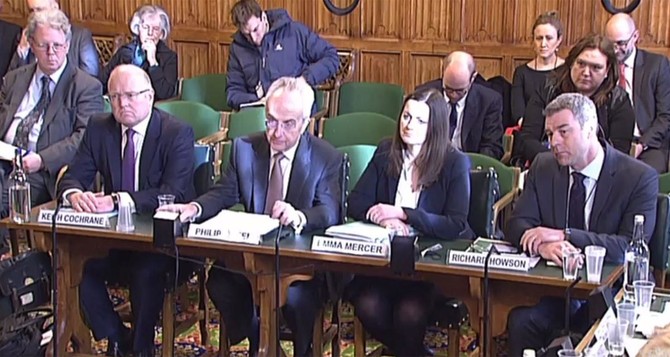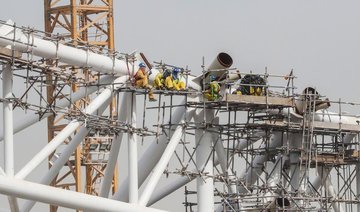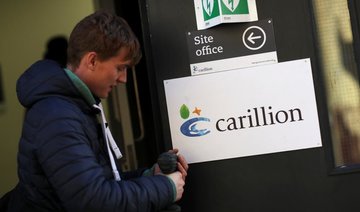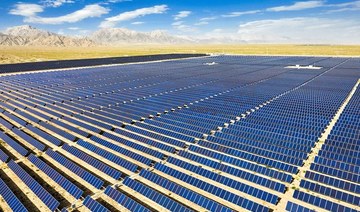LONDON: Carillion Group, the British contractor that went bust in January with debts of around £1.5 billion ($2.09 billion), asked for British government assistance to get overdue payments from Qatar in spring 2017, before its financial problems became public.
In evidence to Members of Parliament (MPs), Richard Howson, the former chief executive, revealed that he wrote to Liam Fox, the minister for international trade, last May, warning him of the problem.
A copy of that letter, seen by Arab News, said that unpaid debts on a flagship project in Doha with Msheireb Properties, a Qatar government-owned entity, had become a serious issue for the British company.
“The position on that project has deteriorated significantly, and despite continued efforts to engage with Msheireb and its advisers at the highest levels, we find ourselves in a position of having to request the assistance of HM government to help the current impasse, which is having a significant financial burden on our business both regionally and for the Carillion Group as a whole,” the letter said.
Carillion has cited the £200 million owed by Msheireb as one of the main factors in its collapse.
“We remain committed to completion of the project, but the lack of payment since October 2016 and the employer’s (Msheireb) recent proposal to introduce a third party contractor to assist in completing the works at significant cost is significantly hampering our ability to do so,” the letter continued, asking what support Carillion might expect from the British government in getting the debts repaid.
The letter also referred to an April meeting between Carillion executives and Fox in the British ambassador’s residence in Muscat, where unpaid debts from Oman were discussed.
It has not been made public how much Oman owed Carillion, but the company has said that £314 million of the £845 million “black hole” revealed last July came from the Middle East.
Howson told the MPs that he had briefed Fox on the “increasingly difficult situation” in Oman and Qatar in order to get his help “on turning receivables into cash on those countries.”
Philip Green, former chairman of Carillion, said the collapse happened because the “balance sheet was not able to withstand the shock from four contacts that went badly wrong in 2017. The balance sheet did not have the robustness to withstand it.”
Carillion was also owed significant sums on three infrastructure projects in the UK.
Keith Cochrane, another former chief executive, said that the Qatar project was “a very specific contractual situation. We thought that the government and the former ambassador would help us get a hearing on that matter.”
Howson has previously told MPs he “felt like a bailiff” on his monthly trips to Qatar to try to recover money.
The contract at the center of the dispute is Downtown Doha, a $5.5 billion (SR20.62 billion) project to develop a central area of the city. The developer is Msheireb Properties, a subsidiary of Qatar Foundation, which describes itself as a “private, non-profit organization,” with Sheikha Moza Bint Nasser as its chair.
The project has been reported to be part of Qatar’s preparations for the 2022 Fifa World Cup bid, but it was launched before the country was awarded the rights to run the biggest football competition in the world, in December 2010.
Carillion was brought on board in late 2011 for one of the early phases of the project.
Msheireb has denied that it refused to pay Carillion for work on the project, which is now almost complete, and claimed that money paid to the UK group was used to pay other bills.
The Carillion executives were being questioned by members of Parliament on a joint committee overseeing public accounts and administration.
Howson previously told a different committee: “But for a few very challenging contracts, predominantly in Oman and one in Qatar, I believe Carillion would have survived.”
Msheireb in Doha did not answer a phone call seeking comment.
Carillion asked UK government to step in over Qatar debt black hole
Carillion asked UK government to step in over Qatar debt black hole

Closing Bell: TASI closes in green to reach 12,198 points

RIYADH: Saudi Arabia’s Tadawul All Share Index rose on Thursday, gaining 95.24 points, or 0.79 percent, to close at 12,198.44.
The total trading turnover of the benchmark index was SR7.15 billion ($1.9 billion) as 81 stocks advanced, while 144 retreated.
Similarly, the MSCI Tadawul Index increased by 17.75 points, or 1.17 percent, to close at 1,530.05.
However, the Kingdom’s parallel market Nomu dipped by 182.13 points, or 0.68 percent, to close at 26,484.03. This comes as 21 stocks advanced, while as many as 33 retreated.
The best-performing stock of the day was Allied Cooperative Insurance Group, with the company’s share price surging by 6.5 percent to SR21.30.
Other top performers included ACWA Power Co. and MBC Group Co., whose share prices soared by 6.19 percent and 4.69 percent, to stand at SR459.6 and SR53.6, respectively.
The worst performer was BinDawood Holding Co. whose share price dropped by 9.98 percent to SR8.03.
Other subdued performers were Al-Babtain Power and Telecommunication Co. as well as Al-Baha Investment and Development Co., whose share prices dropped by 7.67 percent and 7.14 percent to stand at SR42.75 and SR0.13, respectively.
On the announcements front, MBC Group Co. announced its interim financial results for the period ending March 31, with revenues amounting to SR1.23 million and net profits reaching SR121,28.
The group does not have comparative figures for the current reporting period, as it was incorporated on April 20, 2023, which is subsequent to the comparative reporting period.
BinDawood Holding Co. also announced its financial results for the same period with revenues amounting to SR1.47 billion, up from SR1.38 billion in the first three months of 2023.
In a statement on Tadawul, the company said: “This growth was driven by exceptional performances from both retail brands (BinDawood and Danube) where sales for BinDawood stores increased by 8.5 percent compared to Q1 2023, while Danube stores increased by 7.1 percent compared to Q1 2023.”
It added that the improvement in performance was fueled by enhanced preparations for the pre-Ramadan season and the ongoing success of the loyalty program.
Its net profits also rose in this period reaching SR60.54 million, marking a 15.9 percent year-on-year increase, due to the rise in sales and gross margin.
In another development, Qassim Cement Co.’s revenues in this period surged by 18.8 percent to SR196.41 million compared to SR174.07 million in the first quarter of 2023. This increase was attributed to the rise in sales volume as well as the increase in the average selling price.
The company’s net profit surged to SR74.22 million compared to SR54.93 million in the corresponding period last year. The reason for the increase was attributed to the increase in sales value and volume, despite the increase in the general and administrative expenses.
Arabian Centers Co.’s revenues saw a slight increase of 1.56 percent to SR585.8 million in the first quarter of this year, compared to SR576.8 million in the corresponding period in 2023.
The rise was mainly attributed to a 21.9 percent increase in media sales and a 48.0 percent increase in other revenue.
Its net profit decreased by 52.1 percent from SR388 million in the first quarter of 2023 to reach SR185.6 million in the corresponding period this year.
GCC housing ministers discuss joint action in Qatari capital

RIYADH: Gulf Cooperation Council countries are set to have better coordination in their housing projects as top ministers met in Doha to discuss the Joint Housing Action Plan for 2024.
Saudi Minister of Municipal and Rural Affairs and Housing Majid Al-Hogail headed the Kingdom’s contingent at the 22nd meeting of the GCC Housing Ministers Committee in the Qatari capital, where leaders deliberated over key housing issues and made multiple decisions.
These included the approval of the Real Estate Incentive Guide, which aims to link landowners with developers and financial entities.
They also approved the guide for evaluating the flexibility of cities in the field of housing in GCC countries, as well as the economic framework for partnership with private institutions to encourage investment in the real estate sector.
The meeting also announced the launch of the sixth edition of the GCC Housing Work Award under the theme “Smart Digital Applications and Technologies in Housing Projects and Programs.”
The monetary value of the award was increased to SR375,000 ($99,987) instead of SR100,000, emphasizing the importance of ministries and relevant institutions in the Gulf countries promoting the new award cycle to expand participation.
Ministers emphasized the importance of continued participation in regional and international activities and meetings related to accommodation to showcase the region’s efforts.
The UAE was nominated for membership in the Executive Bureau of the Asian-Pacific Assembly and the upcoming presidency of the UN Human Settlements Programme General Assembly. Additionally, the committee highlighted the necessity of activating the mechanism for exchanging experts among GCC countries.
Furthermore, discussions were held regarding the General Secretariat’s proposal to sign agreements with various specialized organizations serving the residency sector, including the International Federation for Housing and Planning and the International Housing Association.
Following the meeting, the dignitaries toured the accompanying exhibition, where the ministries in the Gulf countries showcased their prominent efforts and projects through their participating pavilions.
At the end of the tour, Qatar’s Minister of Social Development and Family Mariam Al-Misnad honored the GCC ministers.
Qassim’s private sector environment in focus during ministerial visit to region’s chamber

RIYADH: Private sector involvement in Saudi Arabia’s Qassim region took center stage during a visit by a top investment official to the province’s chamber.
Minister of Investment Khalid Al-Falih convened with investors and company leaders at the headquarters of the Qassim Chamber on May 15, where they discussed ways to enhance the regional investment environment and overcome obstacles, and also examined the role of the private sector in achieving the economic goals of Vision 2030.
Al-Falih emphasized that the Qassim region is filled with innovative investment experiences and initiatives, such as fish farming and feed manufacturing, encouraging these contributions to serve as a blueprint for sustainable investment globally.
ACWA Power’s Shuaa Energy 3 granted commercial operation certificate for 300MW solar project

RIYADH: The third stage of a Dubai-based 900-megawatt solar project being developed by Shuaa Energy 3 is ready to begin commercial operations, it has been announced.
Saudi energy firm ACWA Power — which owns a 24 percent stake in the company behind the facility — revealed in a Tadawul filing that the Project Commercial Operation Certificate of Phase C of the project has been granted.
PCOC is a document confirming that the facility at Mohammed bin Rashid Al Maktoum Solar Park is fully completed and ready for commercial operation.
Phase C, encompassing an additional 300 MW, contributed to the complete plant achieving commercial operation with a total capacity of 900 MW.
The plant utilizes bifacial photovoltaic technologies, which harness reflected solar rays on both the front and back sides, in conjunction with a single-axis tracking system, to enhance energy production.
Shuaa Energy 3 is a special purpose vehicle established to develop the fifth phase of the solar park, and is also owned by the Dubai Electricity and Water Authority and Gulf Investment Corporation.
Together with ACWA Power, they have entered into a 25-year power purchase agreement to generate clean energy, aligning with Dubai Clean Energy Strategy 2050.
Earlier in May, ACWA Power signed a power purchase agreement with the National Electric Grid of Uzbekistan for the Aral 5-gigawatt wind power project worth SR18.2 billion ($4.85 billion).
Under the terms of the deal, ACWA Power will build, own, operate, and transfer the wind farm at the end of the 25-year contract term.
The project, located in Uzbekistan, is in the development stage and total investment value may change when it reaches financial close, according to the company’s statement.
On the same day, the Saudi utility firm also signed a senior debt financing agreement for the Qassim 1 Combined Cycle Power Plant for SR5.69 billion.
The deal, signed through Qudra One Electricity Co., will extend 28 years, according to ACWA Power’s statement to Tadawul.
The senior debt was financed by a combination of international and local commercial lenders, including Standard Chartered Bank, Bank of China, Riyad Bank, as well as Saudi National Bank, Alinma Bank, Saudi Investment Bank, and Saudi Awwal Bank.
The plant capacity is 1,800 MW.
Egypt’s exports to Arab countries up 8.7% in 2023, Saudi Arabia tops list

RIYADH: The value of Egyptian exports to Arab countries surged 8.7 percent year on year to reach $13.6 billion in 2023, according to new data.
A statement from Egypt’s Central Agency for Public Mobilization and Statistics revealed that Saudi Arabia topped the list of the highest Arab countries importing from the nation during the year, with the value of the African country’s exports amounting to $2.7 billion in 2023.
This falls in line with the significant growth in trade relations, partnerships, joint projects, and development investment between the two countries in recent years.
The statement revealed that the Kingdom was followed by the UAE, with Egyptian exports reaching $2.2 billion, followed by Libya with about $1.8 billion, Sudan with an estimated $984.4 million, and Algeria at $850.3 million.
Regarding the top commodity groups exported to Arab countries during 2023, the agency indicated that vegetables and fruits were exported with a value of $1.3 billion, followed by machinery and electrical appliances with a worth of $1.1 billion.
Furthermore, Egypt’s exports of pearls, precious stones and jewelry to the Arab countries came next, amounting to $1 billion, while exports of fuel, mineral oils and distillation products stood at $753 million.
Meanwhile, the country’s exports of plastics and manufactures totaled $712 million.
On the imports side, the CAPMAS statement disclosed that the value of Egyptian imports from Arab countries reached $12.4 billion during 2023, down from $17 billion in 2022.
Once again, Saudi Arabia topped the list of Arab nations that exported the most to Egypt during 2023, with the value of Egypt’s imports amounting to $5.2 billion,
Kuwait came next, with the African country’s imports amounting to $2.7 billion, followed by the UAE with $2.1 billion, Oman with $717.4 million, and Bahrain with $399.5 million.
The prominent commodity groups imported from Arab countries during 2023 included fuel, mineral oils, and distillation products worth $6 billion, followed by plastics goods valued at $2 billion.
Egypt’s imports of recycled raw materials amounted to $785.1 million, followed by aluminum and its products at $399.2 million, and then fish, oysters, and molluscs at $213.3 million.
The CAPMAS statement noted that the volume of trade exchange between Egypt and Arab countries dropped 11.8 percent year on year to reach $26 billion in 2023, according to new data.
In March, American capital market firm S&P Global upgraded its outlook for Egypt to positive from stable.
According to a statement released at the time, the US-based firm also affirmed Egypt’s debt rating at “B-/B.”
This grade indicates that the country currently has the capacity to meet its financial obligations but faces ongoing uncertainties.














